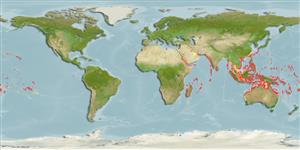Common names from other countries
>
Holocentriformes (Squirrelfishes, soldierfishes) >
Holocentridae (Squirrelfishes, soldierfishes) > Holocentrinae
Etymology: Neoniphon: Greek, neos = new + Greek, niphon = to snow (Ref. 45335).
Environment: milieu / climate zone / depth range / distribution range
นิเวศวิทยา
เกี่ยวกับทะเล,น้ำเค็ม เกี่ยวกับหินโสโครก; ระดับความลึก 0 - 46 m (Ref. 9710). Tropical; 30°N - 32°S, 31°E - 123°W
Indo-Pacific: Red Sea and East Africa to the Marquesan and Ducie islands, north to southern Japan, the Ogasawara and Hawaiian islands, south to northern Australia and Lord Howe Island.
Length at first maturity / ขนาด / น้ำหนัก / Age
Maturity: Lm 15.0 range ? - ? cm
Max length : 32.0 cm TL เพศผู้/กระเทย; (Ref. 9710); common length : 23.0 cm TL เพศผู้/กระเทย; (Ref. 9948)
เงี่ยงครีบหลัง (รวม) : 11; ก้านครีบอ่อนที่หาง (รวม) : 11 - 13; เงี่ยงครีบก้น: 4; ก้านครีบอ่อนที่ก้น: 7 - 8. Pinkish silvery above, silvery below; a dark red to black spot on each scale. Reddish stripe along LL (Ref. 4201). Outer margin of caudal lobes and anterior soft rays of dorsal and anal fins reddish; pectoral fins pale pink, pelvic fins white (Ref. 4201).
This schooling species inhabits seagrass beds and hard-bottomed habitats from the reef flat to depths of 46 m or more on lagoon and seaward reefs. Often found with branching Acropora coral (Ref. 9710). Most common Neophion found in shallow areas (Ref. 9710). Benthopelagic (Ref. 58302). Feeds on small fishes (Ref. 30573), small crabs, and shrimps at night. Venomous spine at the corner of its preopercle. Marketed fresh (Ref. 9948). Solitary (Ref 90102).
Life cycle and mating behavior
Maturities | การสืบพันธุ์ | Spawnings | Egg(s) | Fecundities | ตัวอ่อน
Randall, J.E. and P.C. Heemstra, 1986. Holocentridae. p. 415-427. In M.M. Smith and P.C. Heemstra (eds.) Smiths' sea fishes. Springer-Verlag, Berlin. (Ref. 4201)
IUCN Red List Status (Ref. 130435)
CITES (Ref. 128078)
Not Evaluated
Human uses
การประมง: มีการค้าเพียงเล็กน้อย; สถานที่แสดงสัตว์และพืชน้ำ: การค้า; เหยื่อ: usually
เครื่องมือ
Special reports
Download XML
แหล่งที่มาจากอินเตอร์เน็ต
Estimates based on models
Preferred temperature (Ref.
115969): 24.7 - 29, mean 27.9 (based on 954 cells).
Phylogenetic diversity index (Ref.
82804): PD
50 = 0.5312 [Uniqueness, from 0.5 = low to 2.0 = high].
Bayesian length-weight: a=0.01585 (0.01028 - 0.02444), b=3.00 (2.87 - 3.13), in cm Total Length, based on LWR estimates for this species & (Sub)family-body (Ref.
93245).
ระดับชั้นอาหาร (Ref.
69278): 3.6 ±0.2 se; based on diet studies.
ความสามารถในการกลับคืนสู่ปกติ (Ref.
120179): ความสูง, เวลาต่ำสุดที่จะทำให้ประชากรเพิ่มขึ้นเป็น 2 เท่าใช้เวลาน้อยกว่า 15 เดือน (K=0.5).
Fishing Vulnerability (Ref.
59153): Low to moderate vulnerability (26 of 100).
